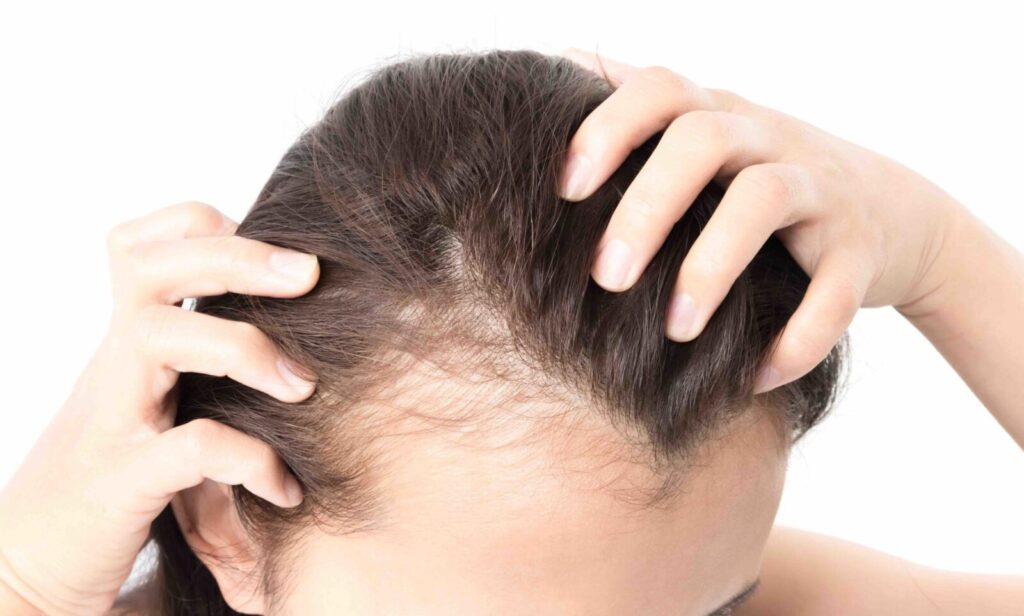
Hormonal Havoc: How Imbalances Can Impact Your Hair Health
Hair – often considered a crowning glory, can be deeply affected by internal imbalances. One major culprit lurking beneath the surface? Hormonal fluctuations. From temporary shifts during pregnancy to chronic conditions like thyroid disorders, understanding the link between hormones and hair loss is crucial for both prevention and treatment.
Let’s Unravel the Hormonal Web:
- Estrogen & Progesterone: These female sex hormones play a key role in hair growth. As estrogen levels decline during menopause, hair can become fragile and susceptible to shedding. Similarly, fluctuations in progesterone can also contribute to hair loss.
- Androgens: These male sex hormones, present in both men and women, can trigger a condition called androgenic alopecia (pattern baldness). In men, high levels of testosterone convert to dihydrotestosterone (DHT), which shrinks hair follicles, leading to hair loss. While women naturally have lower androgen levels, imbalances can still cause similar issues.
- Thyroid Hormones: An overactive or underactive thyroid can disrupt the hair growth cycle, leading to both thinning and excessive shedding.
- Polycystic Ovary Syndrome (PCOS): This hormonal disorder in women can lead to elevated androgen levels, potentially causing hair loss on the scalp and increased facial hair growth.
Recognizing the Signs:
Hair loss due to hormonal imbalance can manifest in various ways:
- Gradual thinning on the scalp, particularly at the crown or hairline
- Excessive shedding during brushing or showering
- Patchy bald spots
- Changes in hair texture, becoming brittle or dry
Seeking Solutions:
If you suspect hormonal hair loss, consulting a non-surgical hair specialist is crucial. We can help by:
- Conducting a thorough medical history and scalp examination
- Performing blood tests to assess hormone levels
- Diagnosing the underlying cause and recommending appropriate treatment
Treatment Options:
Depending on the specific hormonal imbalance and the severity of hair loss, various non-surgical treatments may be recommended:
- Medications: These can include hormonal therapies, topical minoxidil, or medications to address thyroid imbalances.
- Nutritional modifications: Ensuring a balanced diet rich in essential vitamins and minerals can support hair health.
- Low-level laser therapy: This non-invasive treatment can stimulate hair growth.
- Scalp micropigmentation: This cosmetic procedure creates the appearance of thicker hair through tiny deposits of pigment on the scalp.
Preventing the Problem:
While some hormonal imbalances are unavoidable, certain lifestyle changes can promote healthy hair and potentially mitigate some hair loss:
- Manage stress: Chronic stress can exacerbate hormonal imbalances.
- Maintain a healthy weight: Weight fluctuations can affect hormone levels.
- Get enough sleep: Adequate sleep is essential for overall health, including hair growth.
- Consider hair-healthy supplements: Consult your doctor before starting any supplements.
Remember: Early diagnosis and intervention are key when dealing with hormonal hair loss. By understanding the underlying causes and seeking professional help, you can take control of your hair health and regain your confidence.
Regards,
Dr. Satish Vaishnav
Hair Doc, Trichology Expert, Hair Clinic
Thane, Pune, Chhatrapati Sambhajinagar, Pimpri-Chinchwad



